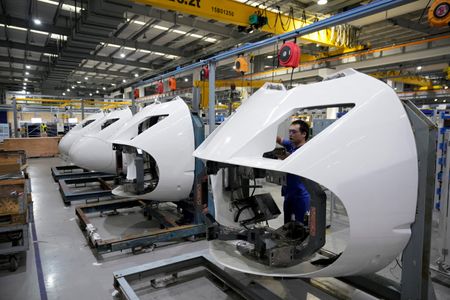BEIJING (Reuters) – China’s factory activity shrank in November as widespread COVID-19 curbs disrupted manufacturers’ output, a private sector survey showed on Thursday, weighing on employment and economic growth in the fourth quarter.
The Caixin/S&P Global manufacturing purchasing managers’ index (PMI) rose slightly to 49.4 in November from 49.2 the previous month and beat expectations of a Reuters poll of 48.9. But the reading marks the fourth monthly contraction in a row as the 50-point index mark separates growth from contraction on a monthly basis.
The figure followed downbeat data in an official survey on Wednesday with manufacturing activity falling to a seven-month low in November, hit by prolonged lockdowns and curbs in many places including Beijing and Guangzhou.
Analysts see mounting downside risks to China’s economic growth in the fourth quarter despite a flurry of policies to shore up activity, including reserve requirement ratio cuts and support to rescue the sluggish property sector.
Sub-indexes of factory output, employment and new export orders all fell at a sharper pace in November from October, the private Caixin survey showed.
In particular, greater difficulties were seen in the sector’s job employment with the rate of job shedding hitting the quickest since February 2020, as some workers were unable to return to work due to virus curbs while production constraints weighed on staffing levels.
“The market is in urgent need of policies to promote employment and stabilize domestic demand,” said Wang Zhe, an economist at Caixin Insight Group, suggesting policymakers further coordinate fiscal and monetary policy to expand domestic demand and boost income of the poor population.
Surveyed factory owners also linked delivery times to delays from pandemic restrictions, with the sub-index for delivery times falling to the lowest since May when Shanghai was under lockdown.
As external demand for Chinese goods weakened amid global recession risks and rising inflation, the sub-index of new export orders dipped further, suggesting a sharp rebound of China’s exports is unlikely.
The Caixin manufacturing PMI centres on small firms and coastal regions, which includes a number of exporters.
However, manufacturers were generally upbeat in November that production would increase over the next 12 months as they anticipated a recovery in output capacity and client demand when the pandemic recedes.
Health officials said on Tuesday China will speed up COVID-19 vaccinations for elderly people, a move seen as crucial in a strategy to unwind nearly three years of strict curbs that have eroded economic growth, disrupted lives and work, and sparked rare protests in recent days.
(This story has been refiled to correct the quarter to fourth from third in paragraph 1)
(Reporting by Ellen Zhang and Ryan Woo; Editing by Sam Holmes)

